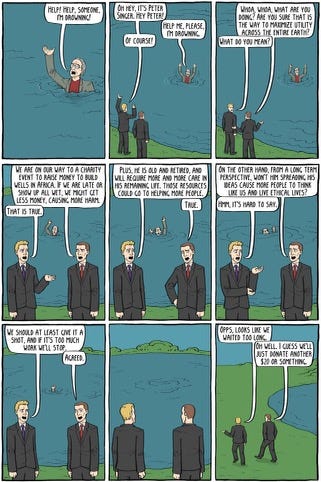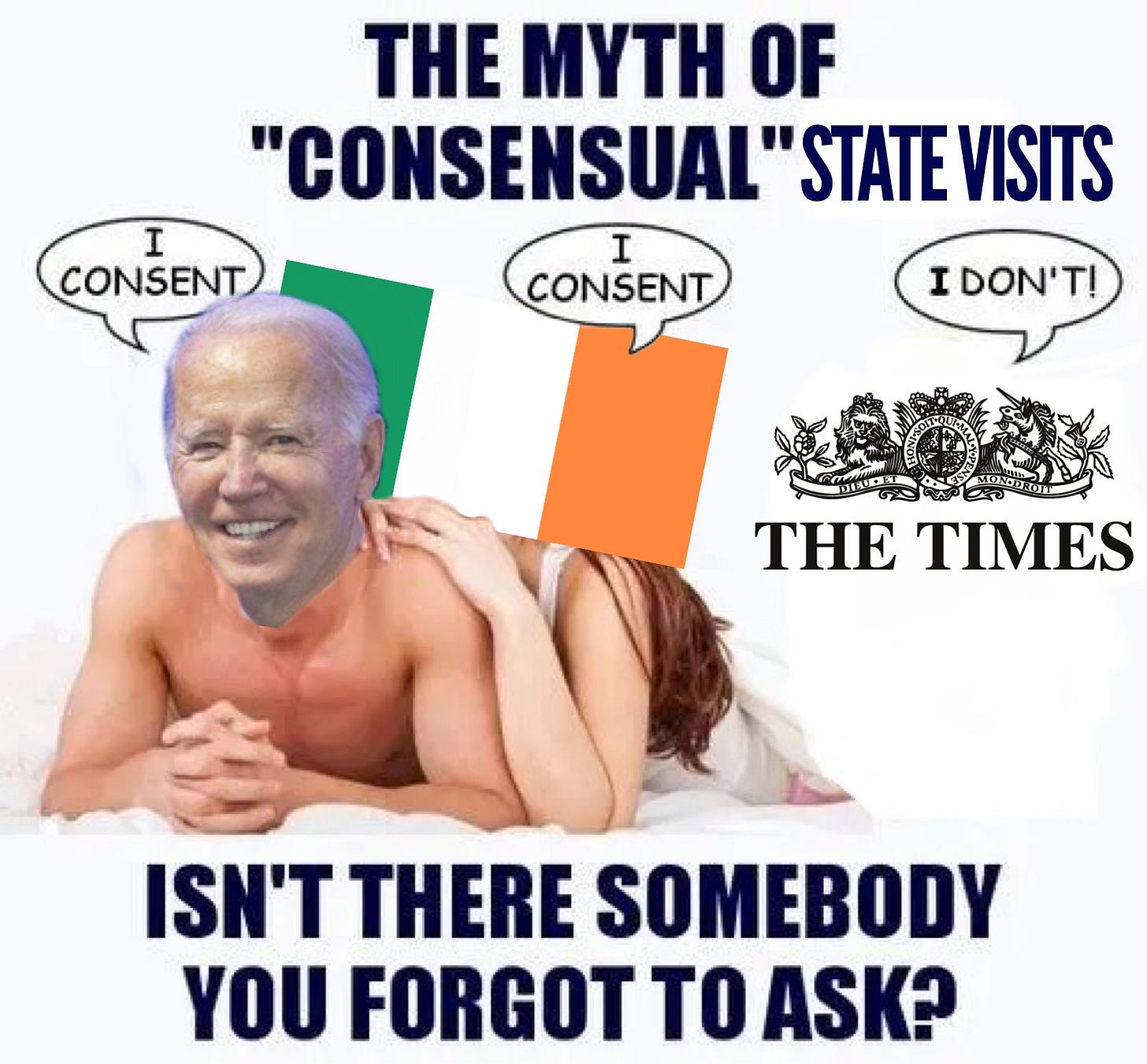Booooks 15
Ireland and Bailouts
Hey!
First thing: Some Twitter users send their opinion about my newsletter:
Substack is at war with Twitter so tweets do not embed like they are subbosed to: https://mashable.com/article/twitter-substack-blocked-embeds-interactions-on-tweets
In the Meantime
My plane got cancelled so I missed the "best chamber concert ever", but got to hang out with N's family for a few days longer -I was awkward.
Anyway! It was a fun week - I finally took out a holiday, my op-ed venture got ditched and we are now racing against time to speak some sense to European Parliament Committee members. Watch us fail or succeed here at this very website, where I will be covering the full story once the embargoes are lifted and my boss, E, is no longer asking suspicious questions about my blog.
N and I went to our favourite Paris places - the cheapest lunch and cheapest dinner in town. Then we proceeded to spend two days sitting side by side and getting through our work - couple goals!
Here is the best meme she found:
No counter-offensive this time around.
So this week I will be covering News and Books simultaneously in two sections. The distinction is that one is news news and the other is a bit stale - hence my attempt to toast it up with a book review.
On the News
Americans are obsessed with Ireland... right?
Joe Biden was in Belfast and later in the Republic of Ireland to an outrage in the British media. Expectedly he made a gaffe. He confused a rugby team (All Blacks) and a murderous British regiment (Black Tans). His visit is important, as the US seems to cannot stop itself from meddling in Irish affairs, trying to push for a Brexit deal that could stop more violence.
Did I say violence? Yes! Northern Ireland saw almost 10% of its current population wiped out in a para-military conflict, between protestant British loyalists and catholic Irish insurrectionists. The history goes all the way back to the early twentieth century and is full of awful acts of terror on both sides. Rural Ulster both in independent reporting and opinionated novels seems to be a wild west ruled by thugs, located somewhere between freedom fighters and drug dealers. According to Kevin O'Rurke and his *Brexit: A short history* written for the benefit of the French audience, the EU proved instrumental in the peace process. The book is generally a pretty poor guide to Brexit. It ignores the regulatory mumbo-jumbo that would keep up at night, and the political drama, but offers good reading on both. It is an Irish book, so it covers Ireland.
Ireland saw two processes playing out for it during the years past the final formation of the Union: It could attract foreign tech giants with promises of low taxes, common law and English language AND far more importantly, the pre-existing border with Britain got puffed out of existence. The first allowed the recovery of Irish growth dynamics. The latter made it possible for Ambulances to finally reach sick in the neighbouring counties and school trips do not include a series of background checks.
So Ireland is the first victim of Brexit, with bright kids from Central Europe who will not get to study at Oxbridge coming as a strong second. The parting of ways between the UK and the Union has proved to spark a range of hostilities and a growing romanticisation of the period of violence: apparently (Economist Podcast Source) Irish female football team was heard to chant joyfully an IRA chant. The Americans and their Hollywood might have that to answer for.
If O'Rurke's book spikes your intrest there is much more to read. A very accessible read is Aleksandra Łojek's Belfast: 99 Ścian Pokoju A Polish social worker and translator embarks on a journey through the divided city, where engagement in conflict is very often a class thing. A similar dynamic is masterfully captured in Nick Laird's prose debut novel Utterly Monkey. Laird is Zadies Smith’s husband and an Allen and Overy's Warsaw office Alumni, which makes him almost a family friend. The novel is not an artistic feat, and his wife remains the better novelist but is interesting for the same reasons her NW got featured in an early issue of this newsletter: incredible social awareness. Of course, it is strongly autobiographical: the guy gets out of his Northern Ireland middle-of-nowhere to work in a Magic Circle Law Firm (a clear reference to A&O) and ends up "getting the girl" who accidentally is black. Not to mention that the ending resembles my teenage daydreaming. But that's unimportant!
Laird's book serves as a good guide to the Irish Condition. Because it also tells us that Belfast is great for a date night... according to Nick Laird Northern Ireland really is like the wild west. Paramilitary organisations and gangs are one and the same thing. The true Brits are of course no better. British press seems to be angry with Biden, but that's because he reminded them that they just do not care about Ulster, and Ireland in general and that they would be better off if people at Stormont just finally came to the only sane conclusion - One Island, One Country.
On the Shelf
One of the recent conversations, with the fervent lefty, of the well-known Krakow family was about banking bailouts. Which was one of many times he claimed to have "attacked me from the left”. So… how is that summer house in Portugal looking?
Just being sensible doesn't mean that I am a bad lefty. The truth is we need banks; and they need us - that is customers, society and the state. Simple as that. So when I defend banks is either to make fun of N. or to prove the point that they are just good to have around.
I was not supposed to write about it, because the last time I cosplayed as a financial blogger I had to take a break from writing this newsletter. But bailouts are more interesting than I thought and pretty relevant to my day job too. But first... some press clippings:
Swiss Objections | The Swiss parliamentary vote last week against state guarantees for UBS’s takeover of Credit Suisse may prove more than just symbolic, some legal experts are warning The parties that opposed the guarantees — the Swiss People’s Party, Greens and Social Democrats — are seeking clarification. Bloomberg
Apparently, the Swiss took it to the streets to oppose tax francs supporting the UBS takeover and now their representatives caught on. So the thing is the state guarantees are of course more complicated than the bailout perse. But because the word has been used in so many contexts and some people fought religious wars over whether something is or is not a bailout, it is sometimes quite confusing to get it right.
So what used to mean - captain state lending money to a failing company now can mean all different things. Including the government not throwing clients of a failing company under a bus. But a refreshing thing about bailouts, and state help, in general, is that elected officials are way more reliable with using it to actually make things better. One of the examples, of course, is the US. The CHIPS Act and the IRA are amazing examples of legislation that, next to clear industrial policy objectives aims to achieve a number of social spillovers: childcare, paid parental leave and inclusion in the workplace. Similarly, financial aid championed by FED during the pandemic proved to 'come with strings attached'. Help to a business hit hard by the virus? Sure - if you keep your employees! As central bankers walk into more complicated crises they need to be more careful with policy design. That creativity, however, allows them to include goals beyond price stability.
That seemingly Limitless ambition is the main theme of NYT's Jeanna Smialek's book about the FED. She chronicles 2020 and 2021 and describes all policy initiatives step by step. It’s a great book to read now, as the myth of dovish fed was quickly exchanged with Pow Pow Powell, who sees everything as a nail and loves hiking more than his daily bike rides:
For a good rundown of how exciting the book is check out the Odd Lots episode with Jeanna:
But that's all super murky. Correct. We are getting there. These bailouts are the better kinds: businesses of social importance failing? Let's make them better with the government money we are pouring into them. The common thing to do after 2008 is to make sure that no executive will get a bonus after they almost went under at the helm of their business. That's just sensible policy... right?
Not really if you are bailing out the coal industry. PGG, Poland's biggest thermal coal producer, loses approximately 10 mln zł a day. In a good year! But coal is kind of important because it keeps a majority of lightbulbs in our country on at night. The government keeps bailing out expensive mines and the mines keep paying up the miners, who earn double the national average salary (and more than two times what I make at the moment).
The state could have done something with that money, attach some strings or at least not be pushed around by the mining lobby... Maybe one day it will.
What I was trying to say is that bailouts are different now - better and so are state help and direct investment. The Financial Crisis and Pandemic taught us some amazing things about policy! Now we just have to apply these lessons... Or not.
Next Up
That's all folks! I will speak to you guys soon. The Lib hunt continues by the way! I will bring you the blood you all want so badly. Also S., S. and K. are coming this weekend so that trockytes lose majority in the house!




